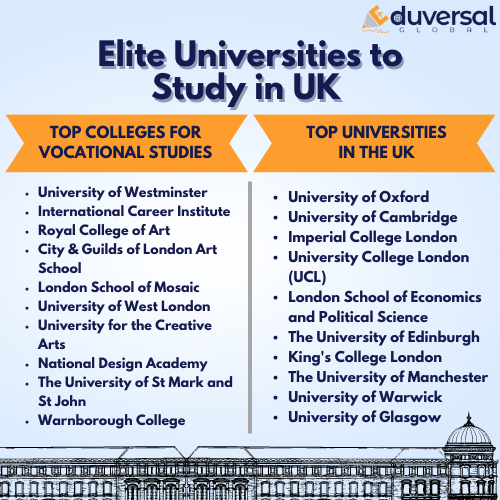The UK constantly ranks well thanks to the hundreds of thousands of international students each year. It is a
popular destination for overseas students because of its multicultural population and reputation for elite
education.
What better nation to study in than the one that created the English language for students from across the world
seeking an English-language education? Still wondering, why choose to study in the UK. Well! Because this
country provides a rich experience for overseas students with an exceptional higher education system and
hundreds of top universities.
At Eduversal, you can discover more about studying abroad in the UK as an international student. This manual
includes guidelines for choosing the UK as a study location, what are the benefits of studying in the UK,
finding housing, knowing more about the institutions and programmes, learning about the history and culture of
the nation, and adjusting to life as an international student there. And, in case of any confusion or
difficulty, you can even hire our professional consultancy to study in the UK.
Why Choose to Study in the UK?
The students still face the dilemma of choosing the UK as their educational destination. Here are five reasons why you must study in UK
-
High-quality learning
-
Experience a unique culture
-
Respected by employers
-
Study in UK Cost
-
Work Opportunities
Just like other popular destinations like Canada, United Kingdom, or the USA, the UK has a long tradition of offering
top-notch education. UK institutions frequently place well in international university league tables and
draw some of the brightest academics from across the globe.
Furthermore, even at the undergraduate level, UK institutions offer specialised degrees. If you wish to
specialise in a topic of study without waiting until the postgraduate level, this is great.
The UK is a cosmopolitan nation, which greatly impacts culture. The UK will make you feel at home
regardless of where you are from.
The UK has a fascinating history and stunning scenery. There is always something to do and diverse
nightlife. You can always find something to do in the UK that adds to your list, no matter where you
study.
Your degree will be regarded and recognised worldwide if you study in the UK. A degree from a UK institution will provide a strong foundation for the working world and assist you in landing your ideal career.
Depending on where you study in the UK, UK degrees can be completed in 3 or 4 years. The typical degree
length in England/Northern Ireland, Wales, and Scotland are three years.
Additionally, organisations and colleges offer many scholarships, grants, and bursaries. The UK has far
cheaper living expenses than other nations, such as the USA. Students can also take advantage of a
variety of discounts.
Outside of classes, an overseas student in the UK is permitted to work full-time for up to 20 hours per
week. Along with your education, you will be able to obtain useful job experience, network with new
people, and make money.
Most university courses encourage and permit students to do an internship as a component of their
education; some institutions may even make this available as a module. This implies that you can gain
experience and strengthen your resume before you graduate. Be sure to provide your IELTS, Duolingo, or PTE test results to your employer!
Study in the UK and establish international connections.
Speak to an expertWhat is the cost of study in the UK?
Depending on the university, studying abroad has a range of costs. Over time, universities' tuition
fees have risen, and if you choose to study in Australia, USA, Canada, or the UK, you will most
likely have to spend almost US$13,050 ($9,250) per year on tuition.
The cost of tuition for international students ranges from £10,000 (US$14,130) for entry-level
courses to over £38,000 (US$53,700) for advanced degrees in medicine and other professions.
| Undergraduate Bachelors Program | £10,000 to £38,000 |
| Postgraduate Masters Program | £11,000 to £30,000 |
| Doctoral Program | £18,000 |
| Entrance Exam Fees | £185 |
| Application Fee for UK Universities | £50-150 |
Top Ten Universities in the UK

Top Courses in the UK
Diploma
- Extended Diploma in Creative Media Production & Technology
- Diploma of Higher Education in Arts and Humanities
- Graduate Diploma in Art & Design
- UAL L3 Extended Diploma Performing Arts (Acting)
- UAL L3 Extended Diploma Performing Arts (Music)
- UAL L4 Foundation Diploma in Art & Design
- UAL L4 Foundation Diploma Fashion
- UAL L4 Foundation Diploma 3D Design
- UAL L3 Extended Diploma in Animation, Film & Games
- Diploma of Higher Education in Art History and Visual Cultures
- Diploma of Higher Education in Classical Studies
- Diploma of Higher Education in English
- Diploma of Higher Education in Mathematical Sciences
- Diploma of Higher Education in Computing & IT and Statistics
- Diploma of Higher Education in Data Analysis
Bachelors
- BSc (Hons) Financial Management
- Online BA(Hons) Degree Photography (Top Up)
- Bachelor of Business Administration
- BA (Hons) Acting
- Online BA (Hons) Music & Sound Top-Up (Fast track for industry professionals)
- BSc (Hons) Business Management with Law
- BSc (Hons) Creative Computing
- BA (Hons) Fashion
- BA (Hons) Film and Moving Image Production
- BA (Hons) Interior Design
- BSc (Hons) Games Development
- BSc (Hons) Business Management with Law with Foundation Year
- BSc (Hons) Business Management with Marketing with Foundation and Placement Yearli>
- BSc (Hons) International Strategic Business Management with Foundation Year
- BSc (Hons) Business Management with Entrepreneurship with Foundation Year
Masters
- Master in Strategic Marketing
- Online Masters Degree in Creative Events Management
- MSc in Accounting and Finance
- Engineering Management MSc online
- MSc in Marketing and Creativity
- MA Communication Design
- Master in Finance and Investments
- Online Masters Degree in Photography
- MSc in Marketing
- MSc in Human Resource Management and Industrial Relations
- MSc in Business Psychology
- MSc in Operations, Project and Supply Chain Management
- MSc in Business Analytics: Operational Research and Risk Analysis
- MSc in International Human Resource Management and Comparative Industrial Relations
- MSc in Innovation Management and Entrepreneurship
Top Government Scholarships

Living Expenses
Since the general cost of living in the UK puts a strain on your finances, there are
several elements to consider when applying for college admission.
To grasp the monthly cost of living in the UK, you must grasp a complete idea of the
average cost of trend, grocery expenses, transit costs, etc. is required. The UK
government sets a £1265 monthly budget as the minimum required for studies in
London.
The average monthly cost of living in the UK is somewhat less than that in London. The
UK government suggests setting aside £1015 per month for cities besides London. However,
there are other costs involved, the cost of food, which in the UK averages roughly £25
per week, accounts for a significant portion of living expenditures.
Open doors to global opportunities with overseas education in the UK.
Grab them with our counsellingLatest Study Visa Guidelines
Student visa requirements for abroad studies in the UK:
- A current passport
- A passport-sized picture that complies with UKVI guidelines
- Confirmation of Study Acceptance (CAS)
- English proficiency required for a visa
-
One of the following expenses requires proof of funding.
- Tuition during the first year; OR
- Full tuition for courses lasting less than a year; OR
- Payment for the following academic year or unpaid fees (if you are extending your visa for further studies)
- Minimum monthly living expenses of £1,023 for a maximum of nine months.
- Evidence of language qualifications such as PTE Test, Duolingo Test, or others.
- Students from non-English-speaking nations must bring copies of all their translated paperwork (in UK English).
Three months before the commencement of your programme is the earliest you may apply. Before your existing visa expires, you must apply. Within 28 days of the expiration of your existing visa, your new course must start. Usually, it takes eight weeks for a decision to be made.
Top Five Cities for Students in the UK

Education System in the UK
The education system in the UK is also split into "key stages", which break down as follows:
Key Stage 1: 5 to 7 years old - Key Stages One and Two, which make up primary school education in the UK, start at age five and last until age 11.
Key Stage 2: 7 to 11 years old - The UK's first two years of secondary schooling are known as Years 7 and 8. They are a component of the Junior School in certain independent schools and the Senior School in others.
Key Stage 3: 11 to 14 years old - As most children go from Junior School to Senior School in Year 9, it is significant in the British educational system. Additionally, it is an excellent starting point for all schools as a foundation for the GCSE programme.
Key Stage 4: 14 to 16 years old - Students begin preparing for the GCSE examinations in the final two years of secondary school, Year 10 and Year 11, at 14. (General Certificate of Secondary Education).
Further education in the UK includes four levels:
Vocational courses - As an alternative to private education, international students might select a public sixth-form college or an institution of further education. From 16, both provide GCSE and A-level programmes for students.
Foundation courses - As an alternative to A levels, these courses result in private exams. Universities with whom institutions have agreements recognise their foundation courses.
Undergraduate study - An honours-level British bachelor's degree is typically conferred in the UK after three years of study.
Postgraduate study - The postgraduate curriculum in the UK is quite rigorous. This indicates that the courses are often substantially shorter compared to other nations. Normally, it takes 12 months to obtain a master's degree.


